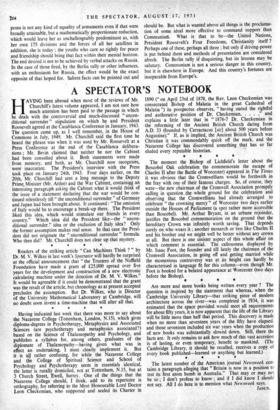A SPECTATOR 'S NOTEBOOK
I AVING been abroad when most of the reviews of Mr. Churchill's latest volume appeared, I am not sure how much attention has been paid to the passage in which he deals with the controversial and much-discussed " uncon- ditional surrender " stipulation on which he and President Roosevelt agreed at the Casablanca Conference in January, 1943. The question came up, as I well remember, in the House of Commons in July, 1949. Mr. Churchill said the first time he heard the phrase was when it was used by Mr. Roosevelt at a Press Conference at the end of the Casablanca delibera- tions ; Mr. Bevin claimed that neither he nor the Cabinet had been consulted about it. Both statements were made from memory, and both, as Mr. Churchill now recognisis, were inaccurate. The President's interview with the Press took place on January 24th, 1943. Four days earlier, on the 20th, Mr. Churchill had sent a long message to the Deputy Prime, Minister (Mr. Attlee) and the War Cabinet, containing an interesting paragraph asking the Cabinet what it would think of the issue of a statement declaring that the war would be con- tinued relentlessly till " the unconditional surrender " of Germany and Japan had been brought about. It continued: "The omission of Italy would be to encourage a break-up there. The President liked this idea, which would stimulate our friends in every country." Which idea did the President like—the " uncon- ditional surrender :' idea or the exclusion of Italy idea? Only the former assumption makes real sense. In that case the Presi- dent did not originate the " unconditional surrender " formula. Who then did? Mr. Churchill does not clear up that mystery.
* * - * *






























 Previous page
Previous page